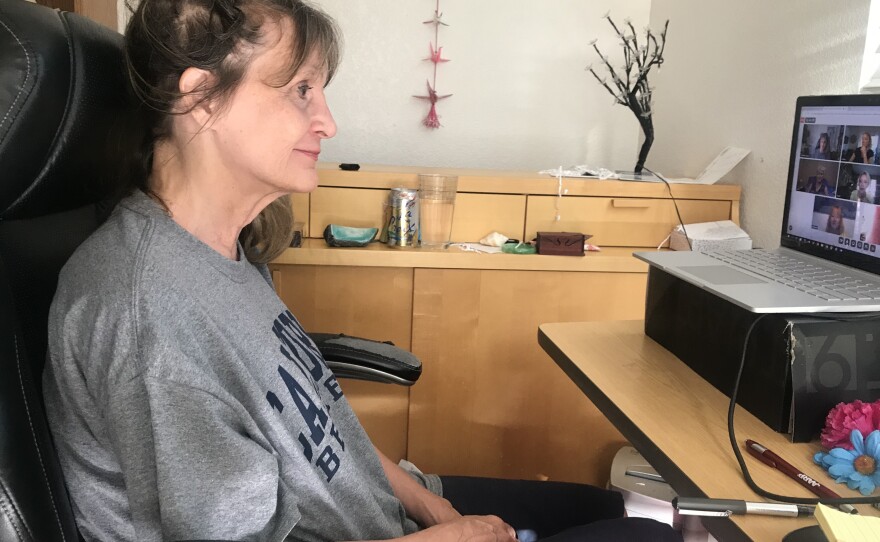Kimberly reached the age of 60 still in good health and was ready for a robust third act filled with travel and adventure.
She’d already visited Cuba and Bali and had big plans for more globetrotting. But then the pandemic hit and everything was abruptly put on indefinite hold.
The single San Diego resident with adult children felt a wave of despondency begin to wash over her.
“My job had always been going out in the community and connecting with people, being at events, speaking at events and doing so much when all of a sudden I was cut off from everyone and everything,” said Kimberly, who did not want her last name published due to sensitivities related to her job.
The coronavirus has exacerbated a loneliness epidemic that already existed among elderly people who are in poor health and live alone. But it’s also impacting seniors whose lives were once packed with travel, hobbies and meetups with friends.
Kimberly says she was able to snap out of her COVID-induced funk with help from the same social network that fueled her pre-pandemic travel. It’s called Stitch, and it claims to be “the world’s largest companionship community.”

When world travel ground to a halt in March, the Australia-based company quickly pivoted from in-person experiences to an online platform. It means Kimberly can keep globetrotting, albeit virtually.
“I visited Hawaii on a Saturday afternoon … I got to get together with some folks with a standup comedian and almost went to visit a haunted mine in Australia,” she said.
“It's kind of ironic because I'm participating in more events during the isolation period than I ever did before.”
Because Stitch is worldwide, someone, somewhere is always available for activities.
“So I can have coffee with a group at six thirty in the morning, which I'm doing tomorrow, and then do things on the weekends,” Kimberly said. “Or, if I have some flex time and have a lunch hour, I can participate in an activity and do some yoga on the weekends.”
Kimberly, who takes care of a brother and her 90-year-old mother, joined Stitch two years ago.
“My kids had all left home,” she said. “And I was saying, 'Great, now I get to have fun, travel, go out to shows.' But as I was planning a trip, I realized that I couldn't find anyone to come with me. And it made me aware that in all those years of raising kids and working, I hadn't really built up a strong network of friends to do stuff with.”
Shrinking Circles
People like Kimberly are precisely why Andrew Dowling founded Stitch in 2014. The Australian came upon the idea after launching another business that provided computer tablets to seniors. He said that experience made him realize how human ties formed through school, work and parenting can fade.
“Our social circles shrink as we get older,” Dowling said. “We found more and more people we were working with, saying, 'You know, this thing you’re doing is great but can you help me make new friends? Like, I’m actually quite lonely.'”
University of Southern California gerontology professor Donna Benton said part of the problem is friends start to leave as people hit middle age.
“We may have actually lost them completely to death,” Benton said. “If that happens, your network is smaller. And it’s that much more difficult to develop new networks.”
RELATED: Volunteers Serve As Lifelines To Isolated Seniors Amid Pandemic
Researchers say loneliness, especially among older people, can cause inflammation, dementia and reduce someone’s overall immunity to disease.
“Once we understood that, we thought, well, surely there’s a role that we could use today’s technology in a way that actually creates positive outcomes for people rather than what you normally see on the Internet,” Dowling said.
People connect on Stitch to find people with similar interests. They may go birdwatching, attend the opera, meet for coffee, go on hikes and watch lectures.
Dowling said one woman, who plays the ukulele, even found kindred spirits through Stitch.
“She’s from rural, western New South Wales, the state I live in Australia,” Dowling said. “She thought there’d be nothing for her for a long time. And now she’s connected with people in Canada and the U.S. and they’re doing all this stuff.”
Dowling said that like everyone, he and his colleagues at Stitch were caught flat-footed by the virus.
“Right at the beginning of the crisis, everything fell off a cliff,” he said. “Everyone was kind of freaking out and saying, 'My God, what am I going to do?'” But we found once we added all of the virtual activities and events, it started to really ramp up.”
Like the rest of us, Kimberly can’t wait for the pandemic to subside so she can get back to her normal life. But she plans to keep the worldwide online connections she’s made through Stitch.
“I learned a lot about what's happening around COVID-19, not only scientific points of view and other people's opinions,” she said. “But also more information, as to what stores were open and closed and where to find hard to get items.”






